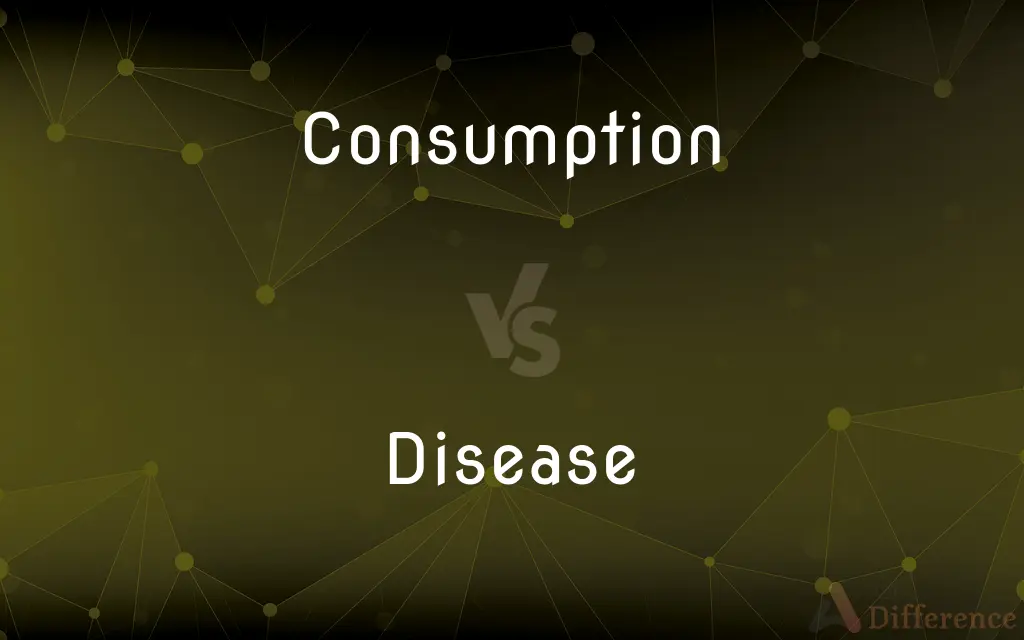Consumption vs. Disease — What's the Difference?

Difference Between Consumption and Disease
ADVERTISEMENT
Compare with Definitions
Consumption
The act or process of consuming.
Disease
A disease is a particular abnormal condition that negatively affects the structure or function of all or part of an organism, and that is not due to any immediate external injury. Diseases are often known to be medical conditions that are associated with specific signs and symptoms.
Consumption
The state of being consumed.
Disease
A disorder of structure or function in a human, animal, or plant, especially one that produces specific symptoms or that affects a specific location and is not simply a direct result of physical injury
Heart disease
Bacterial meningitis is quite a rare disease
Consumption
An amount consumed.
ADVERTISEMENT
Disease
An abnormal condition of a part, organ, or system of an organism resulting from various causes, such as infection, inflammation, environmental factors, or genetic defect, and characterized by an identifiable group of signs, symptoms, or both.
Consumption
(Economics) The using up of goods and services by consumer purchasing or in the production of other goods.
Disease
A condition or tendency, as of society, regarded as abnormal and harmful.
Consumption
A progressive wasting of body tissue.
Disease
(Obsolete) Lack of ease; trouble.
Consumption
Pulmonary tuberculosis. No longer in scientific use.
Disease
(medicine) An abnormal condition of a human, animal or plant that causes discomfort or dysfunction; distinct from injury insofar as the latter is usually instantaneously acquired.
The tomato plants had some kind of disease that left their leaves splotchy and fruit withered.
Consumption
The act of eating, drinking or using.
The consumption of snails as food is more common in France than in England.
Disease
(by extension) Any abnormal or harmful condition, as of society, people's attitudes, way of living etc.
Consumption
The amount consumed.
Gross national consumption
Disease
Lack of ease; uneasiness; trouble; vexation; disquiet.
Consumption
The act of consuming or destroying.
The fire's consumption of the forest caused ecological changes.
Disease
(obsolete) To cause unease; to annoy, irritate.
Consumption
(pathology) The wasting away of the human body through disease.
Disease
To infect with a disease.
Consumption
Pulmonary tuberculosis and other diseases that cause wasting away, lung infection, etc.
Disease
Lack of ease; uneasiness; trouble; vexation; disquiet.
So all that night they passed in great disease.
To shield thee from diseases of the world.
Consumption
The act or process of consuming by use, waste, etc.; decay; destruction.
Every new advance of the price to the consumer is a new incentive to him to retrench the quality of his consumption.
Disease
An alteration in the state of the body or of some of its organs, interrupting or disturbing the performance of the vital functions, and causing or threatening pain and weakness; malady; affection; illness; sickness; disorder; - applied figuratively to the mind, to the moral character and habits, to institutions, the state, etc.
Diseases desperate grown,By desperate appliances are relieved.
The instability, injustice, and confusion introduced into the public counsels have, in truth, been the mortal diseases under which popular governments have every where perished.
Consumption
The state or process of being consumed, wasted, or diminished; waste; diminution; loss; decay.
Disease
To deprive of ease; to disquiet; to trouble; to distress.
His double burden did him sore disease.
Consumption
A progressive wasting away of the body; esp., that form of wasting, attendant upon pulmonary phthisis and associated with cough, spitting of blood, hectic fever, etc.; pulmonary phthisis; - called also pulmonary consumption.
Disease
To derange the vital functions of; to afflict with disease or sickness; to disorder; - used almost exclusively in the participle diseased.
He was diseased in body and mind.
Consumption
The process of taking food into the body through the mouth (as by eating)
Disease
An impairment of health or a condition of abnormal functioning
Consumption
Involving the lungs with progressive wasting of the body
Consumption
(economics) the utilization of economic goods to satisfy needs or in manufacturing;
The consumption of energy has increased steadily
Consumption
The act of consuming something
Share Your Discovery

Previous Comparison
Dipsy vs. Ditsy
Next Comparison
Necromancer vs. Sorcerer














































